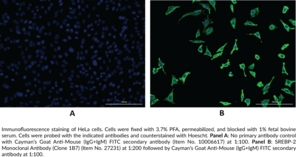Territorial Availability: Available through Bertin Technologies only in France
- Correlated keywords
- SREBP2 SREBF SREBP1a SREBP1c bHLHZip ER nSREBP2 HMGCoA nonalcoholic Class D Basic Helix-Loop-Helix Protein 2 bHLHd2 bHLHd
- Product Overview:
Sterol regulatory element-binding protein-2 (SREBP-2) is a membrane-bound transcription factor encoded by the SREBF2 gene in humans and is involved in the regulation of cholesterol biosynthesis and uptake.{13853,15316,15104} Similar to SREBP-1a and SREBP-1c, SREBP-2 is comprised of an N-terminal acidic domain, a basic-helix-loop-helix leucine zipper (bHLH-Zip) sequence, two transmembrane segments, and a regulatory C-terminal domain.{13853} In the absence of sterols, SREBP-2 undergoes two sequential proteolytic cleavage events resulting in release of the bHLH-Zip-containing N terminus from the endoplasmic reticulum membrane, followed by translocation to the nucleus.{13853,15316} Nuclear SREBP-2 (nSREBP-2) binds to sterol response elements (SREs) in DNA and regulates expression of genes encoding HMG-CoA synthase, HMG-CoA reductase, farnesyl diphosphate synthase, and squalene synthase, among others.{15316} Srebp2 is ubiquitously expressed in mouse tissues and knockout of Srebp2 is embryonic lethal in mice.{12882,15316} Hepatic expression of SREBF2 is seven- and three-fold higher in patients with non-alcoholic steatohepatitis (NASH) and steatosis, respectively, than that of healthy individuals.{48690} Cayman’s SREBP-2 Monoclonal Antibody (Clone 1B7) can be used for immunocytochemistry and immunohistochemistry applications.
Cayman Chemical’s mission is to help make research possible by supplying scientists worldwide with the basic research tools necessary for advancing human and animal health. Our utmost commitment to healthcare researchers is to offer the highest quality products with an affordable pricing policy.
Our scientists are experts in the synthesis, purification, and characterization of biochemicals ranging from small drug-like heterocycles to complex biolipids, fatty acids, and many others. We are also highly skilled in all aspects of assay and antibody development, protein expression, crystallization, and structure determination.
Over the past thirty years, Cayman developed a deep knowledge base in lipid biochemistry, including research involving the arachidonic acid cascade, inositol phosphates, and cannabinoids. This knowledge enabled the production of reagents of exceptional quality for cancer, oxidative injury, epigenetics, neuroscience, inflammation, metabolism, and many additional lines of research.
Our organic and analytical chemists specialize in the rapid development of manufacturing processes and analytical methods to carry out clinical and commercial GMP-API production. Pre-clinical drug discovery efforts are currently underway in the areas of bone restoration and repair, muscular dystrophy, oncology, and inflammation. A separate group of Ph.D.-level scientists are dedicated to offering Hit-to-Lead Discovery and Profiling Services for epigenetic targets. Our knowledgeable chemists can be contracted to perform complete sample analysis for analytes measured by the majority of our assays. We also offer a wide range of analytical services using LC-MS/MS, HPLC, GC, and many other techniques.
Accreditations
ISO/IEC 17025:2005
ISO Guide 34:2009
Cayman is a leader in the field of emerging drugs of abuse, providing high-purity Schedule I-V Controlled Substances to federally-licensed laboratories and qualified academic research institutions for forensic analyses. We are certified by ACLASS Accreditation Services with dual accreditation to ISO/IEC 17025:2005 and ISO Guide 34:2009.





